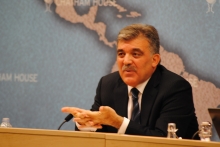Global unions urge Turkish president to veto new trade union law

25 October 2012
President Abdullah Gül
Presidency of the Republic of Turkey
Cumhurbaşkanlığı Genel Sekreterliği
06689 Çankaya, Ankara
Dear Mr. President Gül,
We are writing you on behalf of the Council of Global Unions1 and the European Trade Union Confederation (ETUC), concerning the new “Trade Unions and Collective Labour Relations Bill” which passed the Parliament last week that is now awaiting your approval.
As you may know, the global trade union movement communicated its concerns regarding this law several times to the Turkish government. Furthermore, the International Labour Organization (ILO) drafted a very detailed memorandum which pointed out numerous articles in the draft law that violate the fundamental workers’ rights enshrined in basic ILO standards including Convention 87 on Freedom of Association and Protection of the Right to Organize, and Convention 98 on the Right to Organize and Collective Bargaining.
The European Commission has also been very critical of the changes. The EU Commission has just released the Turkey 2012 Progress Report in which the Commission presents its assessment of what each candidate has achieved over the last year. This report clearly states that the current Turkish labour law is not meeting EU and ILO standards. It more specifically mentions the high thresholds for entering into collective bargaining as well as the restrictions on the right to strike.
We would like to kindly remind you that Turkey has ratified the relevant ILO Conventions and as the President, you bear the heavy responsibility of ensuring that Turkey respects international law and its commitments.
The draft was criticized many times by Global Union Federations (GUFs) and unions in Turkey because it maintains restrictive sectoral, workplace and enterprise thresholds; keeps restrictions on the right to strike; mandates official intervention in the collective bargaining process and keeping bureaucratic barriers related to union membership and collective bargaining process.
Unfortunately neither our concerns nor the ILO’s expert opinion nor the objections of the European Commission were taken into account during the Parliamentary discussions and, although there were a few improvements to the existing law, some new amendments were made to the draft which further violate trade union rights in Turkey. During the Parliamentary discussions, a new article was added to the bill which states that in workplaces with less than 30 employees, there won’t be any compensation in case of anti-union discrimination or dismissals because of union activity. It is a common practice in Turkey to dismiss workers who are organising trade unions. Global Unions CES / ETUC and ETUC and their sectoral structures are informed about union discrimination cases by our brothers and sisters in Turkey almost on a daily basis.
There are 6.5 million workers who work in companies employing less than 30 employees. That represents 70 percent of the workplaces in Turkey. If you sign this law, 6.5 million workers will not have access to any protection against dismissal and anti-union discrimination. That means that it will become virtually impossible for them to exercise their right to organize or and their right to collective bargaining.
Last week during the Parliamentary discussions, the sectoral threshold was set at three percent. Some Government officials declared that they lowered the threshold, which had been 10 percent. Unfortunately, that is not effectively the case. By merging the sectors and changing the method of calculation of statistics, in practice the new law sets the threshold much higher than it was. Many unions will lose their right to collective bargaining if this law is enacted. In some sectors, there will be no union issued with a competence certificate by the Labour Ministry of Turkey to be the official bargaining unit for the workers they represent. 3.3 million workers who are working in these sectors will not be able to exercise their right to collective bargaining. Therefore, once this law is enacted, only 2,7 million workers out of 12 million workforce will have the chance to exercise and enjoy their right to organize and collective bargaining. This is a clear violation of not only ILO fundamental Conventions, but also the European Social Charter, the Constitution of Turkey and global human rights principles and standards.
Turkey definitely needs a new trade union law but not this kind of a law. Governments of Turkey have been criticized repeatedly by ILO because of anti-democratic labour legislation. But this new law falls far short of solving the existing problems of the workforce in Turkey and actually adds new problems to the existing ones. The Constitution of Turkey provides each worker with the right to unionize but unfortunately in practice millions of workers are not able to exercise their right to organize and with this new law, several additional million workers will join their ranks. The workforce of Turkey who contributes so much to the growth and health of the Turkish economy and society deserves a new union law without thresholds and restrictions on right to organize and freedom of association.
Mr. President, The Constitution of Turkey gives you the responsibility to oversee the Parliamentary work and ensure the conformity of laws with the Constitution and international law. Therefore, we urge you to veto this new trade union law.
Thank you for your consideration.
cc: Mr. Guy Ryder, Director General, ILO
Mr Stefan Füller, EU Commissioner for Enlargement and Neighbourhood Policy
Mr László Andor, EU Commissioner for Employment, Social Affairs and Inclusion
Confederation of Turkish Trade Unions (Türk-Is)
Confederation of Progressive Trade Unions of Turkey (DISK)
Confederation of Public Employees' Trade Unions (KESK)
Confederation of Turkish Real Trade Unions (HAK-Is

